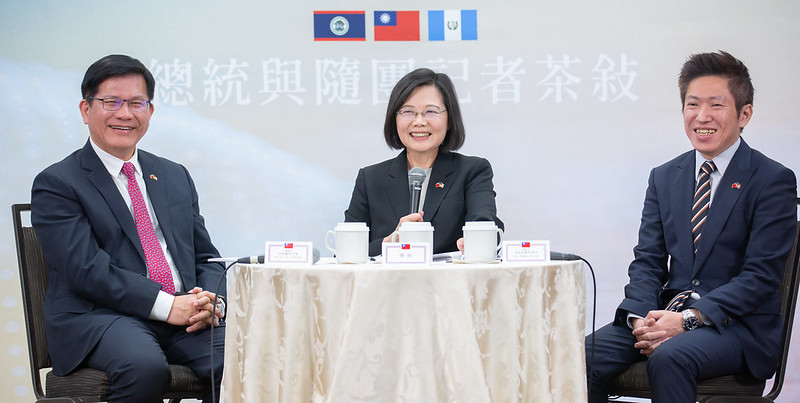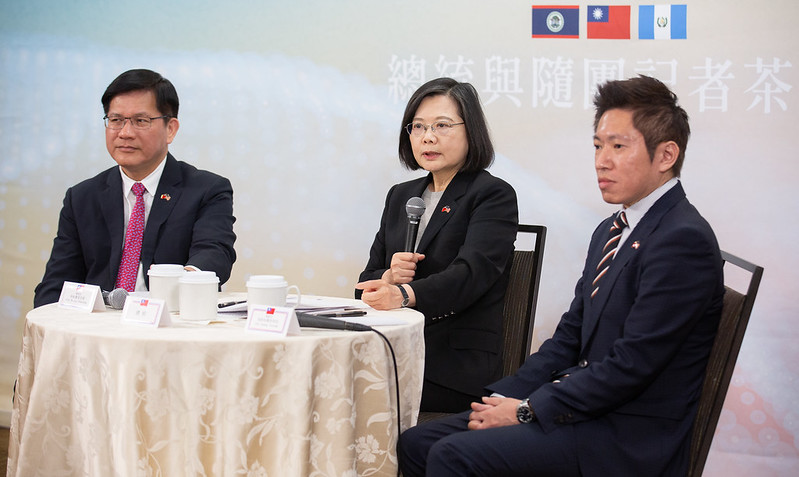News & activities
 News releases
News releases
On the morning of April 6 local time (early morning of April 7 Taipei time), President Tsai Ing-wen held a reception in Los Angeles for the press corps traveling with her delegation. At the reception, she responded to media questions about the transit stop arrangements for the journey, Taiwan-US relations, cross-strait relations, and other topics.
In remarks, President Tsai noted that later that afternoon she would depart for Taiwan and said she wanted to thank everyone in the media for sharing the same tight schedule that she had followed over the past several days. In particular, she noted, the trip coincided with Children's Day and Tomb-Sweeping Day, both of which are important holidays in Taiwan, which meant that the press corps members were unable to spend the holidays together with their families, so she thanked them for their hard work and sacrifices.
President Tsai said that she firmly believes that everyone better understands the state of interactions and cooperation between Taiwan and its diplomatic allies after these past few days. In Guatemala, the president said, President Alejandro Eduardo Giammattei Falla's strong support for Taiwan made a deep impression on us all, and we all saw how the hospital that Taiwan and Guatemala worked together to build is now providing medical services. In Belize, the president said, recipients of the Taiwan Scholarship that we met five years ago have already finished their studies in Taiwan and returned to Belize, and some of them are now working for our technical mission in Belize. She added that our technical mission in Belize continues to promote its breeding sheep and goat production project as well as other projects.
The president mentioned that the last time she visited Guatemala and Belize was during her first term as president. She noted that even though the pandemic reduced opportunities for visits in the interim, her recent visit has had an even bigger impact on her, especially because of the warm reception she and her delegation received from the local people.
The president pointed out that this visit has included transit stops in the US, so the itinerary was quite packed, and that there have been many opportunities to meet with American friends. She thanked American Institute in Taiwan (AIT) Chairperson Laura Rosenberger for her assistance in arranging the transit stops in New York City and Los Angeles.
This being her first overseas visit since the onset of the pandemic, the president said, the international conditions that Taiwan faces are more complex than before, and while the media tends to focus on her as an individual, she said that nevertheless she wanted to tell everyone it takes an entire team working together to complete a mission like this. The president said that throughout this trip, in addition to embassy staff, technical mission personnel, and young people doing alternative national service, we have seen diplomatic personnel fly in from all over the world to lend support to our work, and how diplomats from different generations work together, and how Taiwan's diplomatic corps has grown and changed.
The president also thanked all the colleagues in the diplomatic corps for weathering the pandemic and bearing up under pressure, enabling Taiwan to engage with the rest of the world in broader and more stable fashion. In the future, she said, we will continue working hard. In closing, the president again thanked all the members of the press.
Asked whether her meeting with US House Speaker Kevin McCarthy during the transit stop in Los Angeles should be regarded as "transit diplomacy" or a breakthrough in Taiwan-US relations, the president responded that interpretations will differ as to whether it was a breakthrough, but she herself believes that there are precedents for Taiwan's presidents meeting with our friends during routine transit stops. She added that this recent transit stop provided her an opportunity to meet with our American friends, exchange our concerns, and engage in substantive communications, which she believes to be a very good thing.
Asked about our government's measures to address China's announcement that it will begin boarding and inspecting ships in the waters of the Taiwan Strait, which is equivalent to China domesticating international waters, the president said that the national security staff has paid close attention to the situation in the Taiwan Strait during her trip, and that we are doing everything to ensure that our ships can travel safely and to prevent any acts of interference in the strait.
The media also asked about the choice of California as the place to meet with Speaker McCarthy, to which the president responded that there were plans for transit stops through the US on this diplomatic visit, and that she hoped to have the meeting and exchange views with the speaker sooner rather than later. She added that since there are now many pieces of legislation in the US Congress having to do with Taiwan, this would be an opportunity to discuss views in person on such legislation, and that she believed this is actually very good timing for the meeting.
Asked whether the planning for this trip was impacted in any way by China, the president responded that the entire trip was planned specifically for the goals we planned to achieve, and that meeting with our friends from the US during routine transit stops is both common and not without precedent. She added that having these face-to-face meetings with our American counterparts helps promote peace and stability in the strait and across the region, but also expressed her hope that China can exercise restraint and will not overreact.
The media also asked whether the presidents after President Tsai ends her last term will continue a similar approach to diplomacy and cross-strait issues, to which the president responded that her current guiding policies as president, foreign policy and otherwise, were all formulated specifically to obtain the greatest benefit for Taiwan, and that she believes that what her administration is doing is for Taiwan's greatest benefit. She expressed her hope that whichever party wins the presidency in the next election, the new president will draw up a foreign policy that is in the best interest of Taiwan.
Asked two questions, whether she held a video conference after meeting with Speaker McCarthy to address China's response and whether she and the speaker discussed any of the specifics of arms procurement during their talks, the president responded that the national security staff has been gauging the broader situation and has worked to ensure both the success of the trip and stability in the Taiwan Strait, adding that the national security staff has continued to brief her on the latest developments. On the question of arms sales, the president said that the gist of their discussion was that they hope that the deliveries can be completed as scheduled.
Asked whether Chinese cognitive warfare or semiconductors were discussed during talks with the members of US Congress yesterday, the president responded that many of the people who have come to visit us in Taiwan have mentioned Chinese cognitive warfare and semiconductors, as these are both topics of concern for the international community. But that at yesterday's meeting, she said, more time was spent on discussing Congress' legislation pertaining to Taiwan rather than those two topics.
To the question of whether this trip ends rumors of skepticism toward US support of Taiwan, the president responded that this "skepticism" is in part intentional, that it comes from a lack of information or understanding of the situation, but that in her visits to allies or during transit stops in the US, we could sense that our American counterparts were passionate supporters of Taiwan by virtue of the assistance they provided and through our interactions with US Congress members. She then pointed to yesterday's meeting where Speaker McCarthy was joined by several other Congress members, and they talked about matters of mutual interest, saying that this should send a clear message to the international community and, above all, to the people of Taiwan.
Asked about the views of former President Ma Ying-jeou with respect to cross-strait issues, the president responded that former President Ma's views on cross-strait policy are from the 1970s, and that such views do not accord with the current reality. If we look at the current situation, the president said, it is already very clear that the Republic of China and the People's Republic of China are not subordinate to each other. The president stressed that our primary objective in handling cross-strait issues is to ensure the free and democratic way of life of the Taiwanese people as well as their human rights, and second, that we hope to do all that we can to maintain peace and stability in the Taiwan Strait.
Asked about how she felt about meeting with her family members during this trip, the president responded that she was excited to see her family members since she had not seen them for several years due to the pandemic. Unfortunately, she said, due to her tight schedule, she was unable to sit down and chat with them, and expressed the hope that they will have the opportunity to come to Taiwan for a visit. The president said that likewise, members of our overseas community have friends and relatives in Taiwan, and that she hopes that after the pandemic, our overseas compatriots will come back to Taiwan to see their families and friends.
In response to the many foreign media analyses that said Taiwan has done a good job of controlling the risk of possible Chinese reactions, the president stated that when planning the itinerary for any presidential trip abroad, we must perform a comprehensive assessment, which includes a national security-level assessment. Presidential trips abroad, she said, focus on achieving key national objectives, so during the assessment process for this trip, we had a firm grasp of the national security situation to ensure a smooth trip.
The media also asked how Taiwan can find its own way forward as several former allies have terminated diplomatic relations with Taiwan over the past several years, but also noting that Taiwan has established substantive interactions with democratic partners who are not official allies. In response, President Tsai said that she believes that establishing substantive engagement and relations with various countries is as important as maintaining diplomatic relations with our allies. Therefore, she said, our diplomatic and national security staff should work in tandem and continue their efforts. She added that in our interactions with international friends, we hope to help them understand our situation and how we have handled cross-strait and international affairs with a stable approach, and, in doing so, that we can gain the support of international friends.
In response to a question about whether the US will assist Taiwan's diplomatic efforts or strengthen support for Taiwan's relations with our allies, the president responded that the consistent position of the US has been to support our diplomatic relations with official allies. She added that we are closely monitoring the situation regarding our allies, and that we hope to foster even closer relations so that both parties can uphold the spirit and values of mutual assistance and maintain diplomatic relations.
AIT Chairperson Rosenberger accompanied President Tsai at the reception.










